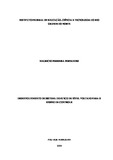Desenvolvimento de sistema didático de nível voltado para o ensino de controle

Visualizar/
Data
2019-12-18Autor
Fernandes, Mauricio Ferreira
http://lattes.cnpq.br/2607992405953092
Metadado
Mostrar registro completoResumo
The Control Theory is the area of knowledge responsible for the study of design and application of different types of controllers for the most varied dynamic systems. This work proposes the development of a low-cost didactic level system. toward the teaching of control. In addition, the level system can be also be used to perform experiments in research activities, once it is a practical tool. The system is composed of three modules: acrylic tank, electronic devices (hardware) and supervisory system (software), which is used to monitor the functioning of the process and the execution of commands. The tank has multiple sections and is built on transparent acrylic. The hardware module is composed by an Arduino Mega 2560, differential pressure sensor to measure the level of the tank, water pump, H-bridge driver L298N and a 12 V source. The code embedded in Arduino is composed by its main file, a class that implements the PID controller and the Util class, which is responsible for treating the serial communication between hardware and the supervisory system. The proposed didactic level system can be operated through commands performed by the supervisory system or using the Arduino Serial Monitor. The supervisory systems correspond to software that provides a userfriendly interface between human operators and a given process/system. Finally, some experiments were performed some experiments using PID controllers. The PID control algorithm is widely used in practice, due to its versality, simple implementation and satisfactory performance in a variety of practical problems. The obtained results demonstrated the functionality of this controller for the level system. More than that, they confirmed that the proposed didactic system can be used in practical experiments as a teaching and learning support tool.



